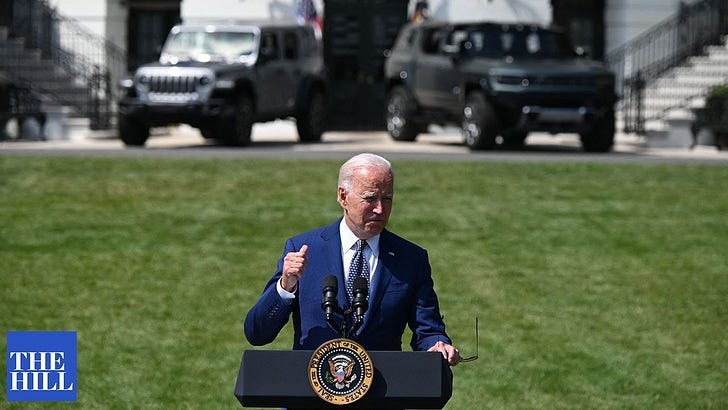Biden Sets 50% Electric Vehicle Goal By 2030
President wants US to reclaim leadership in manufacture of electric vehicles and batteries
President Biden's decision Thursday to set an ambitious new target to make half of all new US vehicles sold in 2030 zero-emissions vehicles is multifaceted in that the goal aims play a role in combating climate change, improving US competitiveness in relation to international competitors and growing good-paying American jobs.
Biden was to sign an executive order that sets an ambitious new target to make half of all new vehicles sold in 2030 zero-emissions vehicles, including battery electric, plug-in hybrid electric, or fuel cell electric vehicles.
The order also kicks off development of long-term fuel efficiency and emissions standards to save consumers money, cut pollution, boost public health, advance environmental justice, and tackle the climate crisis, according to a White House fact sheet.
“So, today labor and industry, state and local leaders are all working together to write the next chapter of the American story. As I've said before, we're in competition with China and many other nations for the 21st century,” Biden said. “To win, we need to make sure the future is made in America.”
Electric vehicles are the future of the automotive industry's future. These include everything from plug-in electric vehicles, to battery electric, or advanced fuel-cell electric, Biden said.
“There’s no turning back. The question is: Are we going to lead, or fall behind in the race for the future?” he said. “It’s whether we're going to build these vehicles, and the batteries that got them to where they are, here in the United States or are we going to have to rely on other countries for those batteries? Whether or not the jobs to build these vehicles and batteries are good-paying, union jobs: jobs with benefits, jobs that are going to sustain continued growth of the middle class. They have to be — they have to be made here in America.”
Biden, particularly sees this new target as necessary for the US economic relationship with China, both to sell electric vehicles to China as one of the largest and fastest-growing electric vehicle markets in the world — as well as out-compete China, which Biden noted, today is home to 80 percent of the manufacturing capacity for electric vehicle batteries.
“Right now, China's leading the race,” the president said.
There's nothing inherently superior in China's technology, Biden said. US labs and industry originally led the development of the technology, he added.
“There's no reason why we can't reclaim that leadership, and lead again. But we need to move, and move fast,” he said.
Industry support
A number of different stakeholders released statements Thursday supporting the Biden initiative, including Ford, General Motors and Dutch automotive company, Stellantis which all released a joint statement.
“Today, Ford, GM and Stellantis announce their shared aspiration to achieve sales of 40-50% of annual U.S. volumes of electric vehicles (battery electric, fuel cell and plug-in hybrid vehicles) by 2030 in order to move the nation closer to a zero-emissions future consistent with Paris climate goals,” the statement said. “Our recent product, technology, and investment announcements highlight our collective commitment to be leaders in the U.S. transition to electric vehicles.
“This represents a dramatic shift from the U.S. market today that can be achieved only with the timely deployment of the full suite of electrification policies committed to by the Administration in the Build Back Better Plan, including purchase incentives, a comprehensive charging network of sufficient density to support the millions of vehicles these targets represent, investments in R&D, and incentives to expand the electric vehicle manufacturing and supply chains in the United States. With the [United Auto Workers] at our side in transforming the workforce and partnering with us on this journey, we believe we can strengthen continued American leadership in clean transportation technology through electric vehicle innovation and manufacturing,” the joint statement added. “We look forward to working with the Biden Administration, Congress and state and local governments to enact policies that will enable these ambitious objectives.”
Did you find this post of value?
Please share it…



